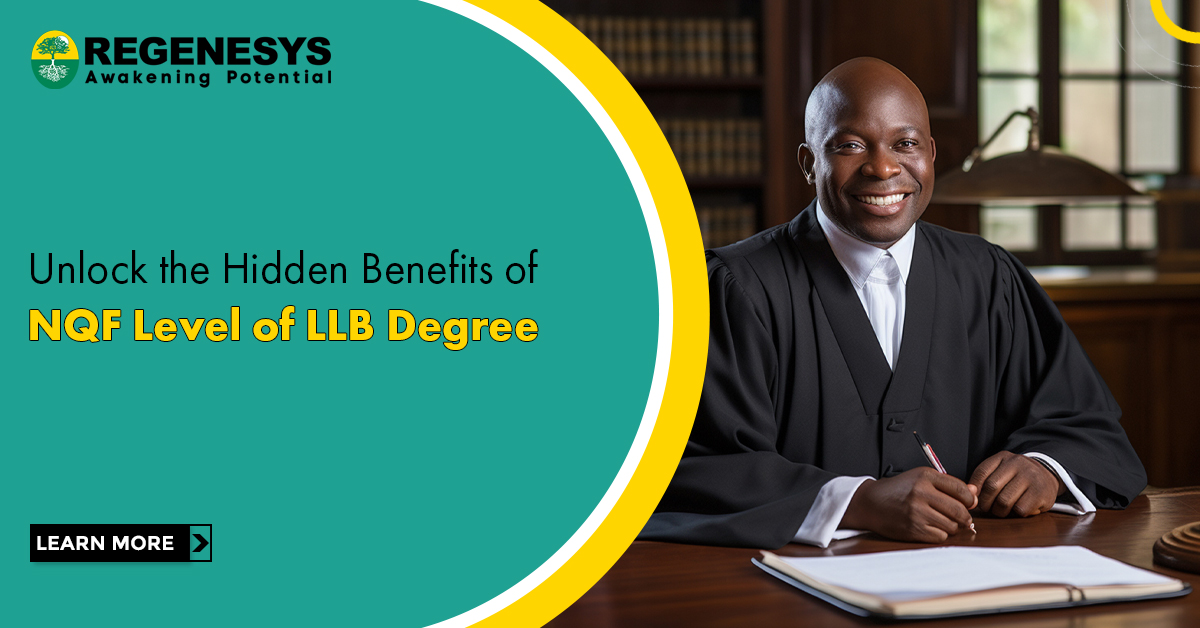A solid educational background is vital for professional success in today’s highly competitive job market. Obtaining an LLB degree is more than just a legal education; it is a pathway to a world of possibilities. But what exactly does this qualification entail, and what is its NQF level?
In this blog post, we will delve into the details of the NQF level of Bachelor of Laws (LLB) degree, providing you with a comprehensive understanding of this qualification.
What is an LLB?
An LLB (Bachelor of Laws) is an undergraduate degree that focuses on the study of law. It’s a foundational programme that equips students with a comprehensive understanding of legal principles and concepts.
Table of Contents
What sets an LLB apart from a Bachelor of Arts or Science degree?
Unlike traditional degrees, the LLB focuses specifically on legal studies. It delves into constitutional law, criminal law, contract law, and more. It’s all about laying the groundwork for future lawyers and legal professionals.
Studying for an LLB is not just about memorising case laws and statutes (although there may be some of that!). It’s also about developing critical thinking skills, analytical reasoning abilities, effective communication techniques, and ethical decision-making prowess.
When you embark on your LLB journey, get ready to immerse yourself in a wide range of fascinating subjects. From dissecting civil procedures to exploring international human rights laws – your course load will keep you engaged and intellectually challenged.
So whether you dream of defending justice in courtrooms or shaping policy through legislation – obtaining an LLB degree is your first step towards making a difference in the world through the power of law!
Also Read: The Evolution of Bachelor of Laws Programmes.
The NQF Level of an LLB
The NQF is a system used in many countries, including South Africa, to measure the learning and skills required for different academic and vocational qualifications. It provides a way to compare qualifications and determine their relative positions regarding complexity, knowledge, and skills.
The National Qualifications Framework (NQF) for LLB (Bachelor of Laws) degree is level 8. The NQF is a framework in that all qualifications in South Africa are allocated to indicate their complexity level and academic rigour. The NQF Level 8 qualifications are considered postgraduate and equivalent to a master’s degree. The NQF Level 8 is considered at a high level of complexity and specialisation within the National Qualifications Framework (NQF).
Also Read: Understanding the NQF Levels for Postgraduate Diplomas in Business Management.
The NQF Level of an LLB: What Does It Mean for Your Career?
For a career in law, having an LLB degree at Level 8 on the NQF can be advantageous. It indicates that you have achieved high legal knowledge and expertise, which can be attractive to potential employers.
Here are some potential benefits of having an LLB at NQF Level 8 for your career:
Professional recognition:
- Professional legal bodies, such as the South African Legal Practice Council, recognise the NQF Level of an LLB degree.
- This recognition can give you credibility and increase your chances of being admitted as a legal practitioner.
More significant career opportunities:
- An LLB at this level equips you with advanced legal skills and knowledge, enabling you to explore various career options within law.
- You could work as a lawyer in a private firm, pursue a career as a legal consultant, or even become a judge or magistrate.
Higher earning potential:
- With advanced legal qualifications, you can secure higher-paying positions within the legal profession.
- Employers often value the expertise and specialisations that come with higher-level qualifications, which can translate into better-earning prospects.
Progression to further studies:
- If you wish to specialise further in a specific area of law, having an LLB at NQF Level 8 can be a stepping stone towards pursuing postgraduate studies, such as an LLM – Master of Laws or a PhD.
- These higher-level qualifications can lead to more specialised roles and academic careers.
International recognition:
- The NQF Level of an LLB degree provides a benchmark for international recognition.
- Employers and educational institutions in other countries may use equivalent frameworks to assess your qualification level, facilitating opportunities for international employment or further studies.
Also Read: Career Opportunities for Bachelor of Law Graduates.

Conclusion
The NQF Level of an LLB degree at Level 8 signifies high legal knowledge and skills. Having this LLB qualification can open doors to various career opportunities within the legal field, increase earning potential, and offer avenues for further specialisation and international recognition.
If you’re passionate about justice and keen to understand how laws function within society, the LLB pathway could be your gateway to a rewarding career!
Stay tuned with Regenesys Law School to explore –The NQF Level of an LLB: What Does It Mean for Your Career?
FAQs on LLB NQF Level
What does ‘LLB’ stand for?
Answer: LLB stands for Bachelor of Laws. It is an undergraduate degree that focuses on the study of law. The abbreviation LLB originates from the Latin term “Legum Baccalaureus,” which translates to “Bachelor of Laws” in English.
Is the LLB degree recognised worldwide?
Answer: Yes. The LLB degree is recognised worldwide and serves as a foundation for individuals interested in pursuing a career in law.
Whether you aspire to become a lawyer, legal advisor, judge, or work in other law-related sectors, an LLB degree can open up various opportunities.
What is the programme structure of Regenesys’ Bachelor of Laws?
Answer: The Regenesys’ Bachelor of Laws is an NQF level 8 qualification, with 480 credits. This is a 4-year programme and is SAQA accredited.
What are the subjects of an LLB stand programme?
Answer: Throughout your LLB programme, you will delve into subjects such as:
Contract law,
Criminal law,
Constitutional law, and more.
By the end of your LLB programme, you will gain essential knowledge about legal systems and principles that shape society.
What are the outcomes of an LLB programme?
Answer: By obtaining an LLB degree, you acquire critical skills like analytical thinking, problem-solving abilities, research proficiency and effective communication – all fundamental aspects required in law.






